
Land of the Rising Sun is a fantasy role-playing game, designed by Lee Gold and published by Fantasy Games Unlimited (FGU) in 1980 that is set in feudal Japan.

Land of the Rising Sun is a fantasy role-playing game, designed by Lee Gold and published by Fantasy Games Unlimited (FGU) in 1980 that is set in feudal Japan.
In Land of the Rising Sun, players take on the roles of samurai warriors. [1] The game, derived in large part from FGU's previously published fantasy role-playing game Chivalry & Sorcery , is a class-and-level system with rules covering honor, martial arts, aerial and water combat, the astral plane, spirits, demons, and ninjas. [1] [2] : 74
In 1977, FGU published the complex fantasy role-playing game Chivalry & Sorcery, noted for both its realism and unwieldy rules. (Game critic Eric Goldberg bemoaned the complexity, saying, "The worst problem arises when the game is actually played — it can move as awkwardly as an octopus on dry land.") [3]
Three years later, FGU set out to create much the same game, but set in feudal Japan. Land of the Rising Sun was released as a boxed set with cover art by Ken Pick, [4] and included a 152-page book and five cardstock reference sheets. [1]
Forrest Johnson reviewed Land of the Rising Sun in The Space Gamer No. 36. [5] Johnson commented that "LOTRS is a beautiful treasure in an unopenable package. Recommended to zealots, and as a source-book to D&D." [5]
Eric Goldberg reviewed Land of the Rising Sun in Ares Magazine #7 and commented that "Land of the Rising Sun is an estimable addition to a FRP aficionado's library. Aside from being well-explained, it is necessary for those who want to fully understand C&S. The care with which Japanese myth has been reproduced is simply amazing." [6]
Wes Ives reviewed Land of the Rising Sun for Different Worlds magazine and stated that "In summary, I strongly recommend Land of the Rising Sun to the role-players in the readership. It is a complete, entertaining game." [7]
In his 1990 book The Complete Guide to Role-Playing Games , game critic Rick Swan called this game "a thoughtful treatment of medieval Japan, skillfully interweaving imaginative fantasy elements with a scholar's understanding of history." However, Swan found "the background material is much better than the turgid game mechanics it supports ... The character creation system is time-consuming and difficult ... combat encounters seem to drag on forever." Swan concluded by giving the game a rating of 2.5 out of 4 and recommending the game as a sourcebook for other fantasy role-playing games, saying "Land of the Rising Sun demands so much from the players that it's more work than fun. However, as a source of ideas, Land of the Rising Sun is worth investigating by any referee interested in an authentic eastern setting." [8]
In his 1991 book Heroic Worlds, Lawrence Schick called the game "Difficult to play, but the sections describing the society, culture, and legendry of medieval Japan are quite detailed." [1]

Fantasy Games Unlimited (FGU) is a publishing house for tabletop and role-playing games. The company has no in-house design teams and relies on submitted material from outside talent.
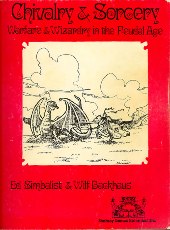
Chivalry & Sorcery is a fantasy role-playing game (FRP) first published in 1977 by Fantasy Games Unlimited. Created by Edward E. Simbalist and Wilf K. Backhaus in 1977, Chivalry & Sorcery (C&S) was an early competitor to Dungeons & Dragons (D&D). The designers of the game were dissatisfied with the lack of realism in D&D and created a gaming system derived from it, named Chevalier. They intended to present it to Gary Gygax at Gen Con in 1977 but changed their minds once at Gen Con once they met Scott Bizar who wrote out a letter of intent. After some changes eliminated the last remnants of D&D, Simbalist and Backhaus published the first edition of their game, now renamed Chivalry & Sorcery.
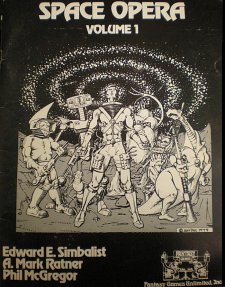
Space Opera is a science-fiction role-playing game created by Edward E. Simbalist, A. Mark Ratner, and Phil McGregor in 1980 for Fantasy Games Unlimited (FGU). While the game's system can be used to create any science fiction genre, Space Opera has a default setting focused on creating space opera themed adventures.

Swordbearer is a fantasy role-playing game published by Heritage Games in 1982, and then republished by Fantasy Games Unlimited (FGU) in 1985. The game featured a number of original innovations, but despite good critical reception, it failed to find an audience under either publisher.
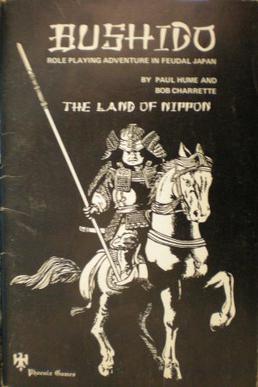
Bushido is a Samurai role-playing game set in Feudal Japan, originally designed by Robert N. Charrette and Paul R. Hume and published originally by Tyr Games, then Phoenix Games, and subsequently by Fantasy Games Unlimited. The setting for the game is a land called Nippon, and characters adventure in this heroic, mythic, and fantastic analogue of Japan's past.

Daredevils is a tabletop role-playing game published by Fantasy Games Unlimited (FGU) in 1982 that is meant to emulate pulp magazine fiction of the 1930s.

High Fantasy is a fantasy role-playing game system originally published by Fantasy Productions in 1978. A second edition in 1981 and several subsequent books were published by Reston Publishing that featured solo adventures using the High Fantasy system. The game received mixed reviews in game periodicals including White Dwarf, The Space Gamer, Different Worlds, Ares, and Dragon.
The Red Book is a trademark of Gamestuff Inc and an unauthorized edition of Chivalry & Sorcery (C&S) role playing game. Its name comes from the red cover of the official first edition. All successive Red Book editions took the same design. Editions of Red Book after the first are named in addition to numbered: Phoenix (2nd), Chimera (3rd), Gorgon (4th), Manticore (5th), Hydra (6th) and Minotaur (7th). Red Book preserves the cover and typeface of the first edition of C&S. C&S was originally created in 1977 by two Canadian game designers, Edward E. Simbalist and Wilf K. Backhaus, and first published by Fantasy Games Unlimited (FGU), an American editor. The second edition was also published by FGU (1983), the third by Highlander Designs (1996), the fourth (2000) and the fifth (2020) by Britannia Game Designs, an English editor.

Thieves' World is a role-playing game supplement published by Chaosium in 1981, based on the Thieves' World series of novels. It was notable for including rules and statistics allowing for its use with nine different fantasy and science-fiction RPG gaming systems.
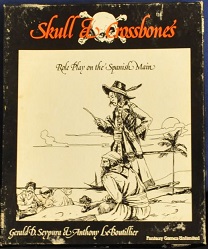
Skull & Crossbones is a role-playing game published by Fantasy Games Unlimited (FGU) in 1980 in which players take on the roles of pirates.

Merc is a modern combat role-playing game published by Fantasy Games Unlimited (FGU) in 1981.

Privateers and Gentlemen is a role-playing game published by Fantasy Games Unlimited (FGU) in 1983 that is set in the Royal Navy during the Age of Sail. The game combines role-playing and ship-to-ship combat. The game received generally positive reviews, although some critics questioned the blending of both role-playing and naval combat, the lack of any scenarios or adventures, and the disorganization of the rules.
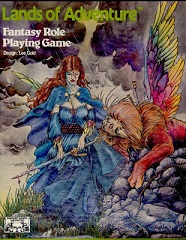
Lands of Adventure is a role-playing game published by Fantasy Games Unlimited (FGU) in 1983. Although similar to fantasy role-playing games in its scope, the suggested setting is historical rather than pure fantasy.
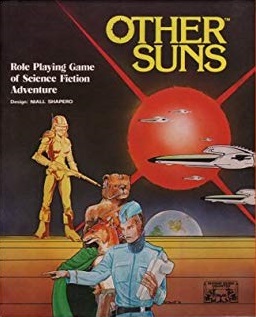
Other Suns is a science-fiction role-playing game published by Fantasy Games Unlimited (FGU) in 1983.

Psi World is a science fiction role-playing game published by Fantasy Games Unlimited (FGU) in 1984 that takes place in a near-future society in which certain individuals have psionic powers.

Adventures in Fantasy is a role-playing game published by Excalibre Games in 1979, designed by Dave Arneson and Richard Snider. The game is a fantasy system, similar to early Dungeons & Dragons (D&D), which Arneson co-created. It received mixed to negative reviews in game periodicals, including The Space Gamer, Ares, and Pegasus, and ultimately flopped. Arneson later bought the rights to Adventures in Fantasy and published a new edition in 1981 through his own company Adventure Games.
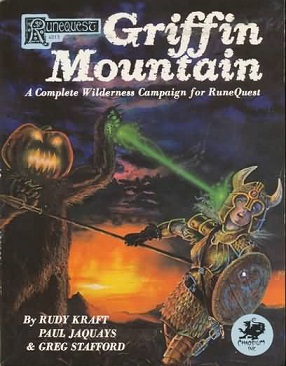
Griffin Mountain is a tabletop role-playing game supplement for RuneQuest, written by Rudy Kraft, Jennell Jaquays, and Greg Stafford, and published by Chaosium in 1981. Griffin Mountain is a wilderness campaign setting for the RuneQuest system, focussed on the land of Balazar and the Elder Wilds. It contains role-playing material to help gamemasters design adventures in the setting. It received positive reviews in game periodicals including Ares, White Dwarf, The Space Gamer, and Dragon.

Adventures In High Fantasy is a 1981 role-playing game adventure published by Reston Publishing for High Fantasy.

In The Labyrinth is a 1980 role-playing game supplement for The Fantasy Trip published by Metagaming. An expanded version released in 2019 by Steve Jackson Games as part of the company's revival of The Fantasy Trip.
Rapier & Dagger is a set of rules for a pencil-and-paper fencing duel or fencing using miniatures, published by Fantasy Games Unlimited (FGU) in 1978.